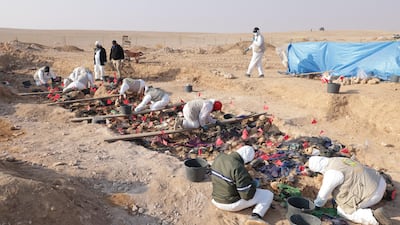A mass grave has been uncovered in Iraq that, authorities say, contains the remains of Kurds, including women and children, who were killed nearly four decades ago under Saddam Hussein's regime.
Between 1987 and 1988, the Iraqi leader ordered operations against on Kurdish guerrillas in country’s north, including the use of chemical weapons, accusing them of collaborating with Iran during the Iran-Iraq war from 1980 to 1988.
The operations, particularly the Anfal campaign of 1988, led to mass killings and disappearances of civilians and the destruction of thousands of villages. As many as 180,000 people are estimated to have been killed.
Since the 2003 US-led invasion that toppled Saddam, hundreds of mass graves have been uncovered at sites across the country including the desert in Al Muthana province, about 300 kilometres south of Baghdad.
The latest mass grave discovery, in the Tel Al Sheikhiya desert, is one of the largest linked to the Anfal campaign and “contains the remains of countless innocent victims, including women and children, whose lives were stolen by the former regime”, Shanaz Ibrahim Ahmed, Iraq’s first lady, said during a visit to the site on Sunday.

In Tel Al Sheikhiya, workers in protective overalls and gloves excavated the remains of victims. Skulls, bones and fragments of personal belongings emerged along with scraps of faded clothing.
“We stand here today on soil that, four decades ago, bore witness to the unimaginable suffering of our loved ones – innocent women, children and men whose lives were cruelly stolen by the former regime,” Ms Ahmed, a Kurd, told a gathering at the site.
“This site, marked by one of the most heinous crimes against the Kurdish people, holds the largest number of mass graves for the victims of the Anfal campaign,” she said, referring to the desert where the grave was found. “To the honourable families of the victims, I extend my deepest condolences. We will exert every effort to bring closure to this painful chapter in our history.”
The grave is the second burial of Anfal victims to be excavated since 2019. Earlier this year, several remains from the 172 bodies found in the Samawa desert in Al Muthana province were identified and returned to families for burial at the Anfal Victims Cemetery in Chamchamal, outside the city of Sulaymaniyah in Kurdistan region.
Forensic experts have conducted four DNA collections to match remains to living relatives, a process Ms Ahmed described as essential to “return these remains to their families for dignified burials and memorial services, paying tribute to their immense sacrifices and the ultimate price they paid for freedom and the homeland”.
The Kurds are one of the largest stateless ethnic groups in the world, with about 30 million concentrated in an area straddling Turkey, Iraq, Iran and Syria. A minority in all four countries, the Kurds speak their own language with several dialects.
Denied their own state when colonial powers drew the map of the modern Middle East after the fall of the Ottoman Empire, the Kurds have long pushed for autonomy or outright independence, sometimes peacefully, at other times through armed rebellion. In Iraq, the Kurds repeatedly rose up against the central government throughout the 20th century.
After the 1991 Gulf War, the US imposed a no-fly zone that allowed the Kurds to exercise de facto autonomy in northern Iraq and made them a close ally. They formalised their autonomy after the 2003 invasion, and the Kurdish region emerged as an oasis of relative stability in post-invasion Iraq, largely spared the violence that plagued the rest of the country.


